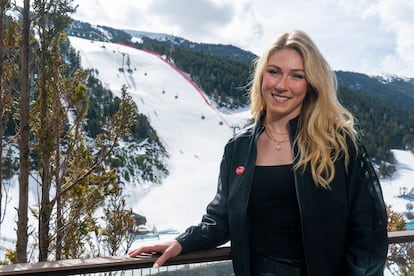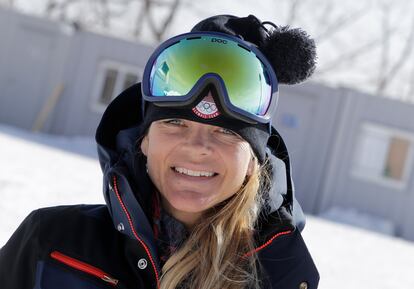The feminist manifesto of the best female skier in history
Mikaela Shiffrin completes her all-female support team by hiring a woman as her head coach

When Adolf Hitler invited her to dinner, German skier Christl Cranz said it was the highest honor she had ever received. It was 1936, and the first female Olympic skiing champion was a fervent Nazi supporter. When she retired from competition in 1941, she donated all her ski equipment to the propaganda campaign preparing for the German invasion of the Soviet Union. Cranz still holds the record for winning the most world championships — 15. Not even American skier Mikaela Shiffrin has that many, and she’s now won 87 World Cup events, more than anyone else, man or woman.
Shiffrin, who just turned 28, was in Andorra for a World Cup event when she proclaimed a feminist manifesto of sorts. The young woman, who considers that she has already achieved a lot, says she will work to ensure that female coaches have more opportunities to strive for loftier goals.
“Everyone asks me what mark I want to leave during the final years of my racing career,” said the skier from Vail (Colorado, USA). A month ago, Shiffrin parted ways with Mike Day, her coach for the last seven years. “Choosing a new coach was very important to me, and I’ve given it a lot of thought. I have chosen Karin Harjo, who was part of my team from 2015-2021, because she is one of the most skilled coaches I have worked with. Because of that, I want her to be my head coach, but also because I want to put a bigger spotlight on female coaches. I want people to know they exist.”

With Harjo as head coach, Shiffrin now has an all-female team around her. Her mother, Eileen, was a good skier in her youth and is now a coach and registered nurse. She has been part of Shiffrin’s team since the 16-year-old joined the World Cup circuit in 2011. Her physical therapist Regan Dewhirst has been on her team for five years, and her publicist Megan Harrod is a former skier who also handles public relations for Norwegian skier Aleksander Aamodt Kilde, Shiffrin’s partner and a World Cup champion. The couple celebrated their excellent racing seasons late into the night last Wednesday at Andorra’s coolest après ski club in the Soldeu Ski Resort.
A few hours later, on March 16, Shiffrin competed in the Super-G slalom, which is not among her best events. Although Swiss skier Lara Gut-Berhami won the event, Shiffrin saw it as a tune-up for the upcoming slalom and giant slalom races, events in which she has already claimed World Cup titles this season. If she wins both races, Shiffrin will finish the season with 15 wins, two less than in her best year, 2019. It would push her total to 89 World Cup wins, just 11 shy of the magic number of 100 wins.
Karin Harjo is the head coach of Team Canada, the second woman to ever lead a national team and one of only eight women coaches at the highest level of skiing, where male coaches number in the hundreds. Harjo hasn’t been by Schiffrin’s side for her recent streak of success. “I wasn’t planning to part ways with Mike Day, who I worked with very comfortably for seven years,” said Shiffrin. “But when I heard Karin wanted to leave the Canadian team and return to the U.S., I told myself I couldn’t pass up this opportunity.”
It’s not the first time Harjo has been a trailblazer for other women. In 2016, she became the first woman to set a World Cup slalom event, a task monopolized by men for male and female events. Since then, two more women have begun setting World Cub events. “For Mikaela to choose me is a breakthrough for other women as well,” Harjo told The New York Times. She will join Schiffrin in April to begin working in Norway. “You can’t take away the impact that it has for women who might say, ‘If she can do it, so can I.’ It’s a really powerful thing; it says that this is a viable career path.”
Karin Harjo has never skied professionally. When she graduated with a degree in molecular biology 23 years ago, she started working in a lab at the University of Washington. Soon after, she surprised everyone, including her Norwegian parents, who were missionaries in Tokyo when Karin was born, by saying she was leaving the lab to become a ski instructor. “It was the classic, ‘I’m just taking a year off, and then I’ll come back,’” said Harjo. “But there’s not one specific way to start any career. And here I am 23 years later… working at my passion with an incredible opportunity you only dream about.”
People are starting to look at Shiffrin in a different light these days. Two years ago, the press called her a childish princess when she refused to attend a World Cup medal ceremony to receive her gold. As it turned out, she was actually protesting that the ceremony had been delayed for several hours to avoid conflicting with the men’s Super-G race.
Sign up for our weekly newsletter to get more English-language news coverage from EL PAÍS USA Edition
Tu suscripción se está usando en otro dispositivo
¿Quieres añadir otro usuario a tu suscripción?
Si continúas leyendo en este dispositivo, no se podrá leer en el otro.
FlechaTu suscripción se está usando en otro dispositivo y solo puedes acceder a EL PAÍS desde un dispositivo a la vez.
Si quieres compartir tu cuenta, cambia tu suscripción a la modalidad Premium, así podrás añadir otro usuario. Cada uno accederá con su propia cuenta de email, lo que os permitirá personalizar vuestra experiencia en EL PAÍS.
¿Tienes una suscripción de empresa? Accede aquí para contratar más cuentas.
En el caso de no saber quién está usando tu cuenta, te recomendamos cambiar tu contraseña aquí.
Si decides continuar compartiendo tu cuenta, este mensaje se mostrará en tu dispositivo y en el de la otra persona que está usando tu cuenta de forma indefinida, afectando a tu experiencia de lectura. Puedes consultar aquí los términos y condiciones de la suscripción digital.









































